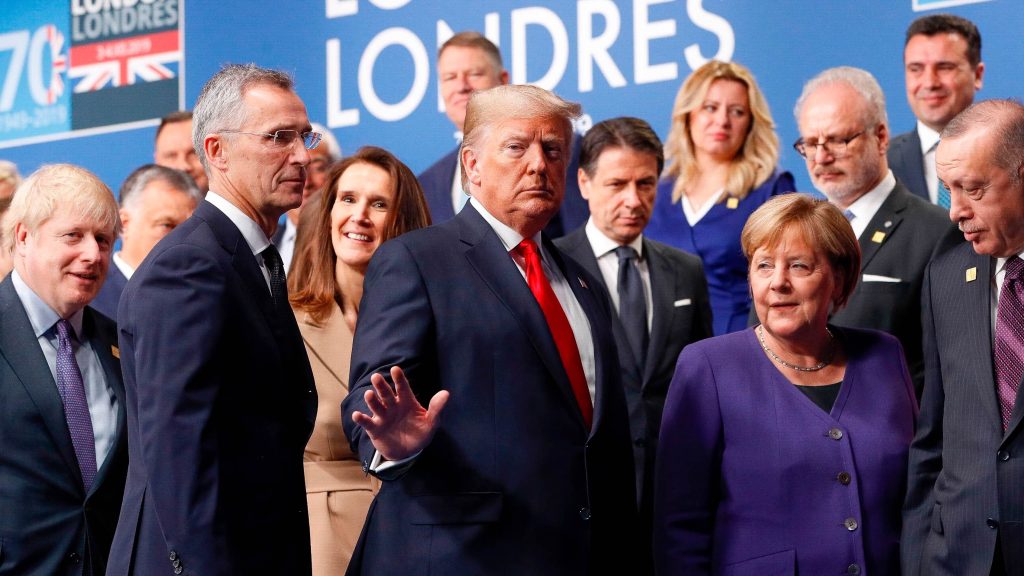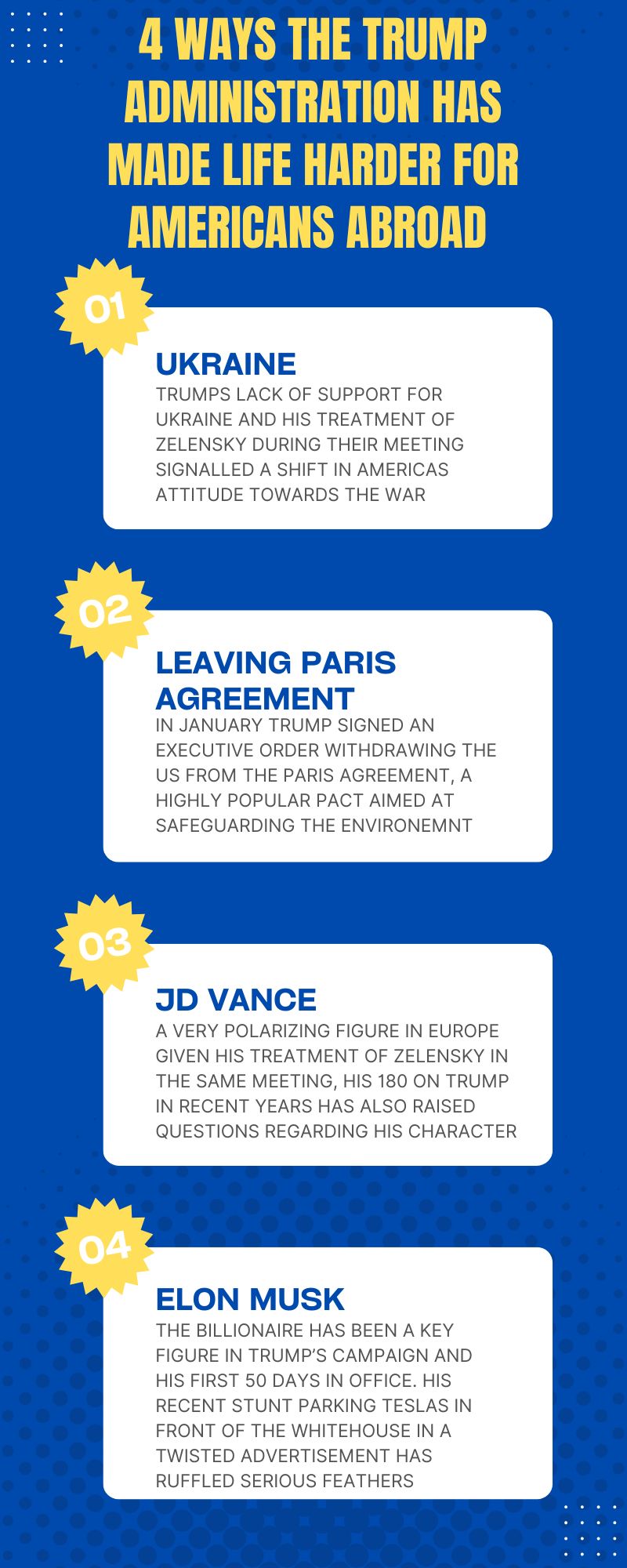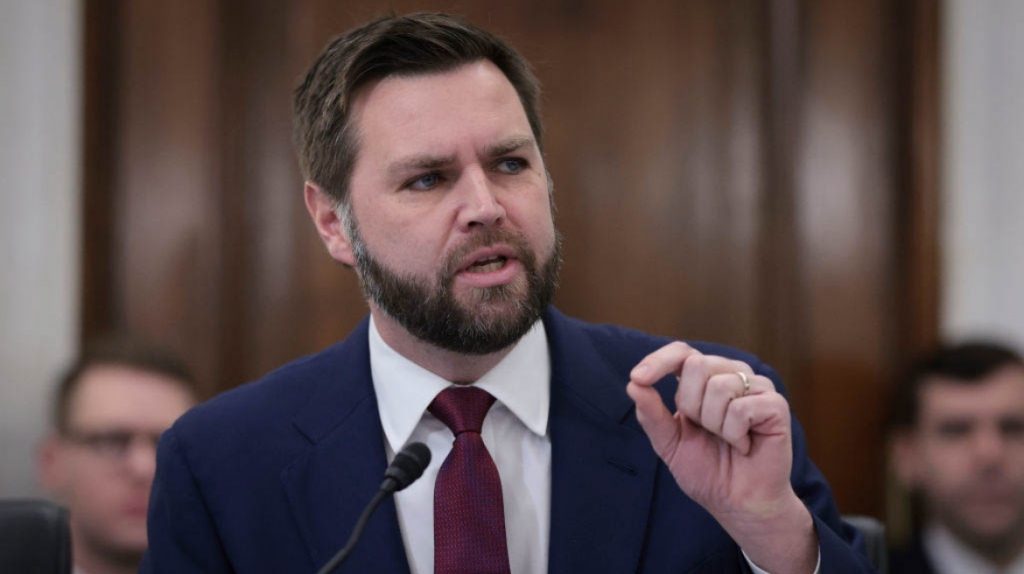As the U.S. navigates complex trade wars and foreign policy shifts following the appointment of Trump as president, how are American students in Cardiff reacting to this?

We have a man in the White House who seems determined to annoy everyone. He has started trade wars, picked fights with allies, downplayed the climate crisis, and most recently, embarrassed Ukraine’s president, who many see as one of the world’s most respected leaders. With all that going on, you might expect American students abroad to be keeping their heads down and avoiding political conversations.
But not Jake.
Jake Miller is a proud Texan and a proud supporter of the Trump administration. He makes no apologies for his stance and says he’s glad to see a president who doesn’t tiptoe around anyone. “It’s refreshing,” Jake says, especially when it comes to Trump’s trade policies. The recent tariffs on countries like Canada, Mexico and China, he says, are long overdue. “We’ve been getting taken advantage of for years. Finally, we have a leader who’s standing up for American interests. These tariffs are necessary to protect our industries and jobs. If other countries don’t like it, that’s on them.”
Alex Carter, a student from Oregon, couldn’t disagree more. She sees Trump’s approach as reckless and counterproductive. “It’s just more of the same chaos,” she says, pointing to the trade wars and diplomatic tensions that have followed. She admits there are Americans who genuinely believe tariffs protect workers, but to her, they are part of a broader pattern of political isolationism. “All it does is drive up prices for consumers. Trump’s policies are about isolationism, which I don’t think is healthy for the U.S. long term.”
Somewhere in the middle is Sam Reynolds from Illinois. He does not get particularly passionate about politics, but he understands why people on both sides feel strongly. “I don’t really get worked up about it,” he says. “On one hand, I get why some tariffs might be necessary to protect American jobs, but at the same time, I don’t want to see prices go up or relationships with our allies fall apart.”
These debates are playing out as the U.S. finds itself in the middle of major trade disputes, with tariffs aimed at levelling the playing field. Supporters like Jake believe this kind of action is essential, even if it causes short-term discomfort. Critics like Alex think it is a dangerous gamble that hurts more people than it helps.

It is not just trade that is sparking debate among these students. The war in Ukraine is another flashpoint, and it has drawn a range of reactions. Alex believes the U.S. has a duty to stand with Ukraine and do more to support its defence. She is frustrated by what she sees as Trump’s dismissive attitude. “He’s humiliated Zelensky,” she says. “One of the most respected leaders in the world, and Trump just brushes him off.”
Jake, unsurprisingly, sees it differently. “We can’t be the world’s police force,” he says. “Ukraine needs to prove they can defend themselves. The U.S. shouldn’t keep footing the bill for someone else’s fight.” For him, American interventionism has gone too far in the past, and he does not want to see history repeat itself.
Sam finds the issue complicated. “I’m torn on Ukraine,” he says. “I feel bad for them, but I also don’t think we should be constantly involved unless there’s a clear benefit to us.” Like many students, he is trying to make sense of a conflict that feels both far away and deeply connected to global politics.
Living abroad means American students are regularly asked to explain or justify what is going on back home. Alex says it happens all the time, and it can be exhausting. “I find myself having to explain a lot,” she says. “Like, no, I didn’t vote for him. And yes, I know it looks bad.”
Jake embraces those conversations. He says many people outside the U.S. do not understand why Trump still has such strong support. “I think it’s important to explain where I’m coming from,” he says. “A lot of people here don’t get it, so I try to give them a sense of the American perspective.”

Sam prefers to steer clear of politics altogether. “I try to focus on other things, sports, music, whatever,” he says. “The last thing I want to do is get into a heated political debate all the time.”
There has also been controversy over Trump’s relationship with Elon Musk, a partnership that has raised concerns about influence and accountability. Alex finds it unsettling. “Yeah, it’s weird,” she says. “He’s clearly all-in with Trump. He benefits from the deregulation and tax breaks, and I think he likes the idea of being a power player.”
Jake sees it as a positive. “Musk is way more in touch with the future than these career politicians,” he says. “It’s good to have someone like him involved. He understands innovation.”
One of the more recent stories sparking debate among American students is the arrest of Mahmoud Khalil, an international student at Columbia University. He was detained following a protest against Israel’s military actions in Gaza. Alex sees it as a serious threat to civil liberties. “If protesting leads to arrests, that’s scary,” she says. “We’re sliding toward authoritarianism.”
Jake does not see it that way. He believes there is a limit to what should be tolerated on university campuses. “There’s a line between free speech and causing chaos,” he says. “The U.S. needs to protect its interests. Universities should be places of learning, not battlegrounds for political extremism.”

Sam remains unsure. “It’s a tough one,” he says. “Security is important, but free speech should be protected. I wouldn’t want to live in a country where protest gets you arrested.”
The Vice President, JD Vance, has also drawn sharp reactions. Once a Trump critic, he is now one of the President’s most loyal allies. “He’s just another Trump lackey,” Alex says. “He saw which way the wind was blowing and abandoned whatever principles he might have had.”

Jake sees it as a sign of political maturity. “Vance is a smart guy,” he says. “He started out sceptical, but he saw that Trump actually delivers on his promises. That’s what matters.”

These conversations reflect the range of political thought among American students studying in Cardiff. Whether they are defending, criticising or simply trying to avoid the conversation, one thing is clear. Being American abroad doesn’t mean leaving U.S. politics behind. In fact, it often means confronting it in new, unexpected ways—and having to decide whether to speak up, stay quiet, or order another pint and change the subject.
